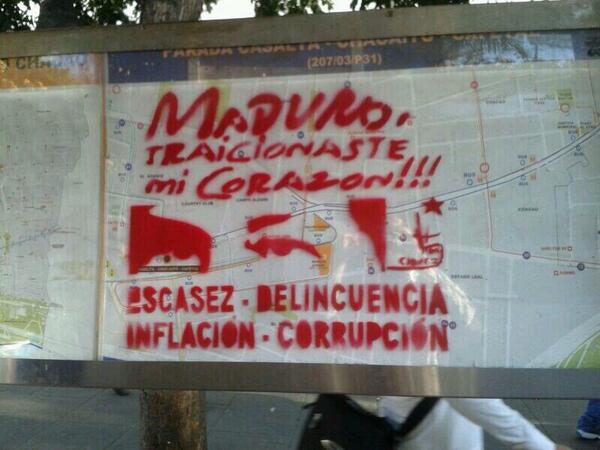Hausmann vs. F-Rod through Aporrea's Eyes


Chavismo has always had two big weapons: a gigantic wad of cash and an incredible compelling narrative. The importance of the latter is easy to overlook. So powerful is it that after 2 years of recession and the highest inflation in the world, chavismo still holds a relatively strong 30% popularity.
The narrative is quite simple. Those who governed in the past were evil and cut the poor out of the loop when the time came to distribute the petrocake. We are socialist, which is a hipster way of saying we are philanthropist philosophers and we will make sure that you get your rightful cut of the infinite wealth that the State has. The narrative is based on a heady mix of tendentious history and economic ignorance, served on a bed of pent-up social resentments.
So, how has this narrative been holding up in these last two years?
Think of it in terms of what Quico calls The Great Macro Debate of 2013-2014. We have been hypnotized by a discussion between Harvard big wigs and BofA’s hotshot in house Venezuelan economist.
That debate for some is quite interesting but it has almost no relevance to people’s day to day lives. At its worst, it’s boiled down to semantics. Most people don’t know who these economists are, don’t read them and can’t make heads or tails of the abstractions they’re discussing.
But there’s a tiny shard of the (don’t laugh) chavista inteligentsia that does read them, and in that crowd, F-Rod has, perhaps unintentionally, started to erode the very foundations of the chavista narrative. Remember that Chavistas are children of the Caracazo which was, in their view of history, a consequence of a set of economic measurements and adjustments that were, in their view, to benefit a few at the expense of many.
These chavista intellectuals – the folks that during the last 15 years have been holding together that narrative can’t – seem to keep it together these days.
It all began with the Monk’s removal and F-Rod’s take on the events. F-Rod, remember, plays the part of spokesman of Transnational Capital’s interest in this little psychodrama: itself a bit of a puzzle, since he’s a former kinda-chavista, and certainly far to the left of the conservative economists like Hausmann and Santos who’ve been advocating (more or less) default. (That, in itself, shows you how scrambled the categories have gotten: only in Venezuela does the socialist left need smelling salts when the conservative right loudly demands we stop paying off Wall Street!)
But I digress…
F-Rod saw Giordani’s removal as a basically positive thing. A step in the right direction. Chavista radicals saw it as a defeat. A clear sign that the bolibourgeois were taking hold and that foreign capital was influencing the higher spheres of power. The BofA report after these events were salt on a wound for these guys.
More recently, Ricardo Hausmann and Miguel Angel Santos caused all kinds of noise in the markets by uttering the words “default” and “Venezuela” in the same breath. The Maduro admisnistration went nuts on the damage control front, to the point of taking a BofA guy into the friggin BCV vaults to show him Venezuelan gold reserves.
On this even I am ashamed that I didn’t ask what Gonzales Liendo asked. Why do we as a nation have to show our gold to this guy? Why is he entitled? Nicmer Evans (Chavismo’s intellectual poster boy, though recently out of favor) seconds those questions. You and I know that the government was looking to boost confidence, credibility. It is a great question to ask. I love it when these Aporrea folks ask questions because they have to think and when they do there is only one possible answer.
The cherry on the top is this Evans article. It’s like listening to him thinking outloud. He painstakingly describes what exactly has been happening. It is like a child piecing together, very slowly, the evidence that Santa doesn’t exist. It’s all a hoax. That the people he trusted the most (its parents) are in it. Everything, the gifts, the economic war, Uribe, the evil empire…all a hoax.
The list-form epiphany:
Una política de contracción intencionada de importaciones pondría en tela de juicio:
- …la magnitud de la anunciada y recalcada guerra económica.
- …el privilegio del pago de la deuda externa desde los bolsillos, el bienestar y la calidad de vida del pueblo.
- …la escasez y las colas, ya que terminarían siendo parte de una política de ajuste macroeconómico encubierto.
- …la liquidez y buen uso de las divisas del Estado.
- …el anunciado privilegio de la políticas del gobierno del presidente Maduro hacia los pobres y los que viven de su salario, ya que al final quienes estarían pagando la crisis serían estos sectores.
- …la transparencia y correcta utilización de los recursos públicos.
So that’s where we are.
What can the MUD do to finish the destruction of the Chavista narrative? What will it do to give that last little push?
Maduro has no resources to keep up with a plainly unsustainable chavecomics approach, nor even the minimal political capital to launch any reform. It’s a dead-end.
Caracas Chronicles is 100% reader-supported.
We’ve been able to hang on for 22 years in one of the craziest media landscapes in the world. We’ve seen different media outlets in Venezuela (and abroad) closing shop, something we’re looking to avoid at all costs. Your collaboration goes a long way in helping us weather the storm.
Donate





